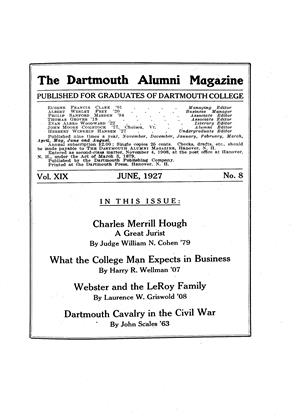New York: Harold Vinal. $1.50.
Reviewed by W. B. PRESSEY I remember a red-haired, bored-looking boy who used to read me poems, sonnets mostly, out of a heart that was breaking, breaking. His girl, I gathered, had given him the air. Mr. Laing has since referred to those poems as "outrageous," and they may have been but even then I admired the fervor and, yes, the variety with which he could pluck his one string. But that, in college time, was long ago, and now Mr. Laing '25, with Mr. R. A. Lattimore '26, publishes a book of poetry which shows no loss in fervor or variety and much gain in instrumentation. Though the best poems, I am sure, of both these authors turn their backs upon the volume's title, still to a Hanover audience especially every poem has its value, and that value is usually high.
For instance, Mr. Laing is able to achieve Eaglet, which, in spite of the wobbly second stanza, seems to me the best thing in the book:
Far from the nest, winged mother, Wheeling in flight, Far ,to the west, winged mother, Far from your sight, I have gone questing Valueless things, Scornfully testing Immature wings.
Riding the gale, proud mother, I too am proud. Swiftly I sail, proud mother, Screaming aloud. Valleys go under. Granite blows past, Shaken by thunder Sweot on the blast.
There must be born, brave mother. Now and again, Children of scorn, brave mother, Children of pain, Who will partake of Sorrow and wrong All for the sake of Snatches of song.
Out of it all, tired mother, Lightning and hail, Ere I must fall, tired mother, Ere my wings fail, May come a regal, Magical thing; The screaming eagle May learn to sing.
So I am blown, Eagle Mother, Seeking strange food, Far have I flown, Eagle Mother, Worst of the brood. Ingrate you proved me Under your breast. Why have you loved me, Always, the best?
And there are many nearly as good. There is Mr. Lattimore's Sung Long Afterwards, and surely no Dartmouth class, unless is were Richard Hovey's, enjoyed a better class poem than his. It says, to be sure, the inevitable things, but it says them almost inevitably. There is Prescription for an Egotist, in which Mr. Laing works out an odd metaphor with extraordinary deftness. And of the ten sonnets, five by each, nearly every one has that smooth tightness which makes the sonnet form so pleasing.
I hope, however, that no nasty reviewer lights on Morning, Unborn. I suppose it is meant to be Japanese—l can't see any other excusebut it is really only the Yellow Peril.
In order to get the full enjoyment both of the books and of this review, you should ask for Hanover Poems at the bookstore.
Courtesy of The College
 View Full Issue
View Full Issue
More From This Issue
-
 Article
ArticleTHE UNDERGRADUATE CHAIR
June 1927 -
 Article
ArticleWHAT THE COLLEGE MAN EXPECTS IN BUSINESS
June 1927 By Harry R. Wellman '07 -
 Article
ArticleATHLETIC COUNCIL REPLIES TO PRESIDENT HOPKINS
June 1927 -
 Article
ArticleSECRETARIES ASSOCIATION MEETS IN HANOVER
June 1927 -
 Article
ArticleDARTMOUTH CAVALRY IN THE CIVIL WAR
June 1927 By John Scales '63 -
 Article
ArticleCAN CHINA SURVIVE
June 1927
Books
-
 Books
BooksHERE IS A BOOK (SCOOP)
February 1940 -
 Books
BooksTHE MOTIVES OF NICHOLAS HOLTZ
March 1936 By H. M. Dargan -
 Books
BooksLABOR PROBLEMS FROM BOTH SIDES,
June 1938 By Harold G. Rugg '06. -
 Books
BooksSWORDS OR PLOWSHARES?
February 1938 By Lewis D. Stilwell -
 Books
BooksESPANA Y SU CIVILIZACION.
JULY 1965 By ROBERT H. RUSSELL -
 Books
BooksTHE SPADE AND THE BIBLE. W. W.
June 1934 By W. H. Wood


